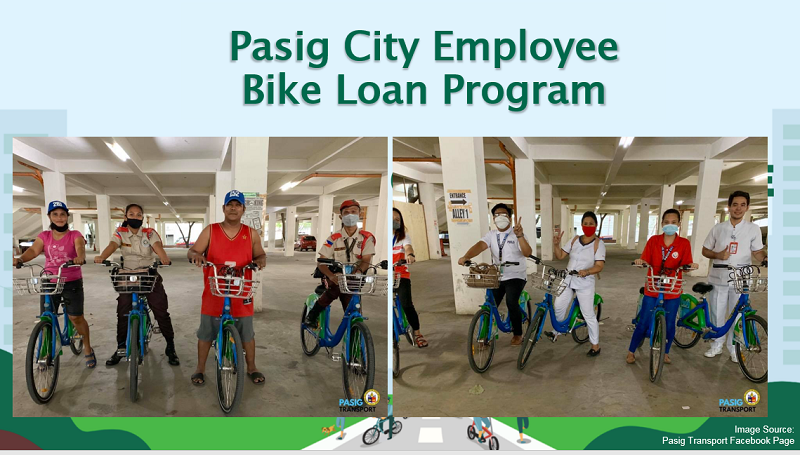
October 22, 2020 Thursday

In support of an eco-friendly and sustainable urban mobility in their city, Pasig City launched an interest-free bike loan program for their employees in the city government. Photos from the Pasig Transport Facebook Page.
MANILA, 23 October 2020 — Mayors of bike-friendly cities and sustainable mobility advocates presented their best practices, programs, and strategies for green and inclusive urban mobility solutions during the 23rd episode of “Stories for a Better Normal: Pandemic and Climate Pathways,” with the topic “Championing Sustainable Urban Mobility.”
The online conversation hosted by Deputy Speaker Loren Legarda featured local chief executives of Pasig City Mayor Vico Sotto and San Juan City Mayor Francis Zamora; with Mr. Chito Bauzon, Assistant Vice President of SM Supermalls. Mr. Red Constantino, Executive Director of the Institute for Climate and Sustainable Cities, co-anchored the show.
In celebration of World Cities Day on the 31st of October, the episode featured Metro Manila cities’ strategies in providing the great majority of the population access to active mobility and non-motorized modes of transportation that are not only safe and functional, but are also efficient and environmentally-sustainable.
“Mobility is something that our working people really need. Ultimately, what is good for our working households is good for the climate. The approach is if we pay attention to development, then the climate benefits as well,” said Red Constantino.
Mayor Sotto shared that Pasig City is developing a system of sustainable mobility by establishing permanent protected and pop-up bike lanes and widening of sidewalks. He also mentioned that they have a bike loan program for frontliners and city employees as their way to address mobility challenges amidst the pandemic. As individuals, Mayor Sotto also stressed the importance of demanding more from the government to ensure a better normal.
“We can engage our government, let’s demand for better public transportation. Let’s demand to lessen the allocation of the road networks for private vehicles, and make it a more equitable system for everyone. Let’s demand these things and engage the government, the groups, and show that together, we can make this new normal a better normal for everyone,” said Sotto.
Mayor Zamora highlighted that championing the environment is one of the key points in the 10-point agenda of ‘Makabagong San Juan’. He also discussed San Juan city’s policies and programs, such as Bicycle Ordinance 2020, separate lanes for bicycles and motorcycles, police bike patrols, solar pit stops for bike repair, the bike-sharing program for employees, public transportation modernization, and the goal of building a solar-powered city.
“There was a time before when people didn’t really care too much about the environment, pero ngayon, nagbago na rin naman ang perspective ng ating mga mamamayan, at lahat naman po ay nag-aalaga sa ating kalikasan. Marami kaming ordinansa which we have passed and we are implementing with regard to the maintenance of cleanliness in our city,” said Zamora.
Mr. Bauzon shared SM Supermalls’ advocacy of creating bike-friendly communities to support the bike-riding public and to contribute to the creation of sustainable cities and in the reduction of pollution.
“Paniniwala po namin, it has to be a holistic approach, hindi lang natatapos ‘yan that we provided bike lanes and facilities, kundi, ano [pa] ‘yung pwede naming maitulong to encourage the public or the people to have a behavioral change, a mindset that supports the need for creating bike-friendly communities,” said Bauzon.
Legarda reiterated that the advocacy of making cities bike-friendly should be expanded, with the help of LGUs implementing programs from the ground, in addition to the strict implementation of ecological solid waste management.
“We must expand the convergence of eco-friendly practices, not just planting native trees but also the implementation of ecological solid waste management because bike lanes and the environment around bikers is so important,” Legarda concluded.
As an online discussion to promote health, environmental consciousness, and climate-adaptive practices, Stories for a Better Normal aims to change the mindset of individuals, families, and communities by demonstrating ways in which a ‘better normal’ can be realized within our communities.
This online discussion is organized in partnership between the Office of Deputy Speaker Legarda and the Climate Change Commission, with support from the Institute for Climate and Sustainable Cities, The Climate Reality Project-Philippines, and the Mother Earth Foundation.